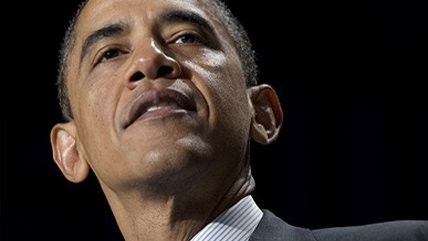Obama's War on the Constitution
The president, who first campaigned on a claim to constitutional expertise, is now the document's biggest threat.

A physician's expertise makes him capable of inflicting great harm, noted Plato a couple thousand years ago, and no one is better positioned to steal than a guard. So perhaps we should not be surprised that the most conspicuous foe of liberty and the Bill of Rights turns out to be a former professor of constitutional law.
As a general rule, politicians tend to whipsaw between two poles. Conservatives try to increase economic liberty but show less regard for civil liberties. Liberals care deeply about civil liberties while trying to restrict the economic kind.
But the Obama administration is remarkable for its degree of disdain for both.
The president's principal first-term achievement was the passage of the Affordable Care Act. The law greatly increases government's role in health care and includes an expansion of government power unprecedented in American history: a requirement that all citizens purchase a consumer good irrespective of their personal behavior.
The administration also has pressed relentlessly – and successfully – for tax hikes, which shift control over economic resources from private hands to government. It also has indulged a regulatory binge, which shifts control indirectly, by cranking out burdensome new rules at a rate far faster than the Bush administration ever did. (This holds true even if you count only "economically significant" rules – those costing $100 million or more – and rely only on administration-friendly accounts.)
The result: Government not only is taking more of your money, it increasingly is telling you how to spend what's left. A recent study estimates the cost of regulation at nearly $15,000 per household. This means the three principal drains on the family checkbook, in order, are: (1) taxes, (2) housing, and (3) regulation. And Washington is working hard to move regulation into the second slot.
While trends like these drive conservatives nuts, they gladden liberal hearts. Yet liberals are not happy with the Obama administration these days – for exceptionally good reasons.
Most saliently, the Justice Department has been trolling through the phone records of reporters for the Associated Press and, even worse, has accused a reporter (Fox News' James Rosen) of acting as an un-indicted co-conspirator in the unlawful leaking of classified materials. Rosen's offense was to do what reporters are supposed to do: break a story. This, too, is unprecedented, and it goes too far even for Obama's most knee-jerk defenders. The New York Times views the investigation as "threatening fundamental freedoms of the press."
The Rosen matter alone would suffice to disqualify the administration from any Friends-of-the-First Amendment society. Yet it is only one of several such assaults. Others include the administration's campaign, through its insistence on a contraception mandate underObamacare, against religious liberty, and the president's suggestion after Citizens United that "we need to seriously consider mobilizing a constitutional amendment process" to limit the free-speech rights of persons who incorporate their social organizations; and its thuggish targeting of its political opponents.
If the IRS' treatment of tea-party groups were an isolated story, you could swallow the explanation that a few low-level bureaucrats went rogue. But that account does not explain why the EPA has been far more generous to freedom-of-information requests from liberal groups than from conservatives. Or why, shortly after the Obama campaign slimed Romney supporter Frank Vander Sloot as a disreputable fellow, he was audited three times – twice by the IRS and once by the Labor Department. Or why, after Texas resident CatherineEngelbrecht started a Tea Party group, she received scrutiny not just from the IRS but also from the FBI. And OSHA. And, just for good measure, the ATF. Or why the IRS took 17 months to respond to an initial tax-exempt status from the conservative Wyoming Policy Institute. Or why it shared confidential files from conservative groups with the liberalProPublica. Or why. . .
Enough on the First Amendment. The president also has tried with considerable vigor to undermine the Second, and has succeeded in subverting the Fourth: Under Obama, who has gone to court to defend warrantless wiretaps he once condemned, warrantless "pen register" and "trap-and-trace" monitoring has soared to unprecedented heights.
In 2011 the president signed a reauthorization of the Patriot Act with just one regret: Congress approved an extension of only one year, while Obama wanted three. He signed into law a defense reauthorization bill allowing the indefinite detention, without charge, of American citizens, thereby gutting the principle of habeas corpus. Granted, he issued an executive order promising not to exercise that power. But the order does not constrain future presidents or, technically, even him.
From a civil-liberties perspective, Obama has carried forward nearly every one of the war-on-terror powers that led liberals to denounce George W. Bush as a goose-stepping fascist, and in fact has made many of them worse. When he retires from public life, perhaps he will return to teaching the Constitution. That should be much easier work – given how little of it there will be left.
This article originally appeared in the Richmond Times-Dispatch.


Show Comments (126)